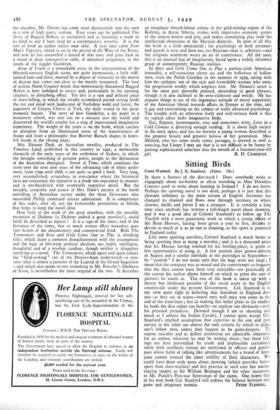Sitting Birds
Guns Wanted. By J. K. Stanford. (Faber. 15s.) Is there a Surtees of the dirt-track ? Does somebody write as engagingly about ice-hockey or all-in wrestling as Miss Dorothea Conyers used to write about hunting in Ireland ? I do not know. Perhaps the sporting novel is not dead, perhaps it is just that this pleasant tributary to the main stream of English literature has changed its channel and flows now through territory to whose charms, thrills and patois I am a stranger. It is certainly a long time since anybody has written a full-length novel about shooting, and it was a good idea of Colonel Stanford's to follow up The Twelfth with a more panoramic work in which a young officer of the Roan Hussars, having been given a year to live, decides to devote as much of it as he can to shooting, as the sport is practised in England today.
Like most sporting novelists, Colonel Stanford is much better at being sporting than at being a novelist ; and it is a thousand pities that his Hussar, having reached for his fowling-piece, is given so few opportunities of using_it. A few poorish days grouse-driving in August and a similar interlude at the partridges in September— by " poorish " I do not mean only that the bags were not large ; I mean that the company was so mixed and the contretemps so frequent that the days cannot have been very enjoyable—are practically all the canvas the author allows himself on which to paint the sort of pictures he excels at. The rest of the book is taken up with a breezy but intolerant pastiche of the social scene in the English countryside under the present Government. Col. Stanford is in my view quite right in believing that Socialism in England does not—as they say of wines—travel very well once you come to the end of the tram-lines ; but in making this belief plain to his readers he loads the dice rather too heavily—or anyhow too obviously—with his personal prejudices. Devoted though I am to shooting and much as I admire the Indian Cavalry, I cannot quite accept Col. Stanford's implied assumption that expertise in the one and past service in the other are almost the only criteria by which to judge one's fellow men, unless they happen to be game-keepers. To expose rascality and to deflate pretension are admirable objectives for an author, whatever he may be writing about ; but these fail- ings are here personified by crude and implausible caricatures while their antithetic virtues are enshrined in officers and gentle- men whose habit of talking like advertisements for a brand of lime- juice cannot conceal the inner nobility of their characters. W,"2 could have done with more about .shooting (which provides better sport than class-warfare) and leis practice at such easy but uncon- vincing targets as Sir William Boulogne and the other successors to Mr. Punch's Post-war Sportsman of the asaos. One hopes that in his next book Col. Stanford will redress the balance between ma


































 Previous page
Previous page